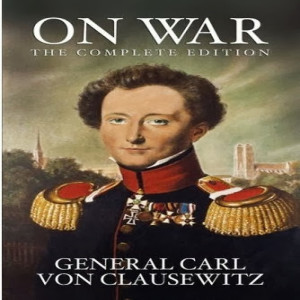
Saturday Apr 10, 2021
SW051 War as Indian Removal by 'Other Means': Applying Classic Prussian Military Strategist's Insights, Maxims to Second Seminole Conflict

The US Government passed the Indian Removal Act of 1830 and that political decision led to U.S. military demands that the Seminole relocate to Oklahoma. The US Government accepted that it might require waging war to enforce the removal. The great Prussian military strategist Carl Von Clausewitz anticipated this contingency: "War is the continuation of politics by other means."Clausewitz warned, though, "No one starts a war -- or rather, no one in his sense ought to do so -- without first being clear in his mind what he intends to achieve by the war and how he intends to conduct."
The Seminole were clear on their political objectives in opening fire on Major Dade's command to begin formal hostilities with the U.S. government: Wage war until the Army agreed to stop forced removal to Oklahoma. They would fight on the run if they had to, with hit-and-run tactics and nuisance attacks. But they would still fight.
In response, the U.S. Army embarked on a punitive operation against the Florida Seminole to achieve its own political objectives by warlike means. It seemed a simple enough proposition. Engage the Seminole in a big battle. Defeat them. Remove them. Restore peace. No one in America had read how Clausewitz would have scoffed at this simple proposition. In war, he wrote, everything is simple. But the simplest things are very, very difficult to perform
Removing the Seminole was only simple on paper. More than seven years later, the U.S. Army had not completed its simple mission to capture all the Seminole and deport them. It eventually gave up on 100% removal, packed up, and went home.
Joining us is US Army Colonel and War College graduate JP Clark, a military historian and a military strategist. He explains how an understanding of Clausewitz could have informed officers in the Second Seminole War -- and does inform us today. Without a copy of On War in its collective haversacks to inform and guide its strategy, operations, and tactics, the Army muddled along in the Second Seminole War. Much blood and treasure might have been spared had the Army's senior officers known of and embraced Clausewitz' strategic insights.
Who was Carl von Clausewitz?

Clausewitz' insights continue to resonate two centuries after he penned them. His relevance to thinking about strategy remains undiminshed by time.

Host Patrick Swan is a board member with the Seminole Wars Foundation. He is a combat veteran and of the U.S. Army, serving in Iraq, Afghanistan, Kuwait, and Kosovo, and at the Pentagon after 9/11. A military historian, he holds masters degrees in Public History, Communication, and Homeland Security, and is a graduate of the US Army War College with an advanced degree in strategic studies. This podcast is recorded at the homestead of the Seminole Wars Foundation in Bushnell, Florida.
Like us on Facebook, LinkedIn, and YouTube. Get the latest episode without delay where and when you want it by subscribing through your favorite podcast catcher, such as iHeart, Stitcher, Spotify, DoubleTwist, Pandora, Podbean, Google podcasts, iTunes or directly from the Seminole Wars Foundation website www.seminolewars.us
No comments yet. Be the first to say something!